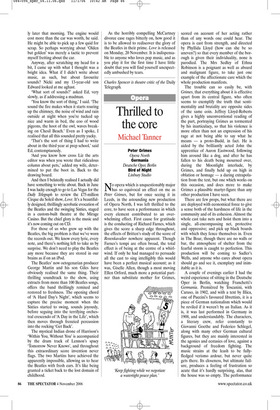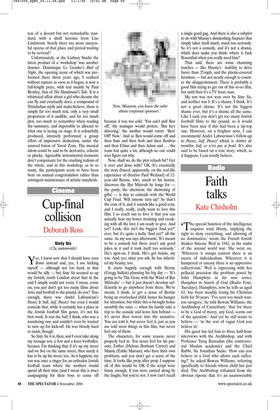Thrilled to the core
Michael Tanner
Peter Grimes Opera North Germania Deutsche Oper, Berlin Bird of Night Linbury Studio No opera which is unquestionably major has so equivocal an effect on me as Peter Grimes, but for once seeing it in Leeds, in the astounding new production of Opera North, I was left thrilled to the core, to have seen a performance in which every element contributed to an overwhelming effect. First cause for gratitude is the conducting of Richard Farnes, which gives the score a sharp edge throughout, the effects of Britten’s study of the score of Rosenkavalier nowhere apparent. Though Farnes’s tempi are often broad, the total effect is of being at the centre of a whirlwind. If only he had managed to persuade all the cast to sing intelligibly this would have been a perfect musical account; as it was, Giselle Allen, though a most moving Ellen Orford, much more a potential partner than substitute mother for Grimes, scored on account of her acting rather than of any words one could hear. The opera is cast from strength, and directed by Phyllida Lloyd (how can she be so uneven?) so that every member of the borough is given their individuality, none is parodied. The Mrs Sedley of Ethna Robinson is a poignant as well as absurd and malignant figure, to take just one example of the affectionate care which the whole production manifests.
The trouble can so easily be, with Grimes, that everything about it is effective apart from its central figure, who often seems to exemplify the truth that sentimentality and brutality are opposite sides of the same coin. Jeffrey Lloyd-Roberts gives a highly unconventional reading of the part, portraying Grimes as tormented by his inarticulacy, so that his violence is more often than not an expression of his rage at not being able to say what he means — a proto-Budd, in fact. He is aided by the brilliantly acted John the apprentice of Aaron Eastwood, following him around like a dog, and after he has fallen to his death being mourned over, during the Moonlight interlude, by Grimes, and finally held up on high in oblation or homage — a daring extrapolation from the text, but one which works on this occasion, and does more to make Grimes a plausible martyr-figure than any other production I have seen.
There are few props, but what there are are deployed with economical force to give a sense both of the harshness of life in the community and of its cohesion. Almost the whole cast take nets and hoist them into a single, all-encompassing net, protective and oppressive; and pick up black boards with which they fence themselves in. Even in The Boar, though there are no walls or bar, the atmosphere of shelter from the fearful storm is caught to perfection. This production will be coming to Sadler’s Wells, and anyone who cares about opera should go and see it, exemplary and inimitable as it is.
A couple of evenings earlier I had the weird experience of sitting in the Deutsche Oper in Berlin, watching Franchetti’s Germania. Premièred by Toscanini, with Caruso, in 1902, and with a text by Illica, one of Puccini’s favoured librettists, it is a piece of German nationalism which would be reviled if it weren’t by an Italian. As it is, it was last performed in Germany in 1908, and understandably. The characters, a literary crew, refer constantly to Giovanni Goethe and Federico Schlegel, along with many other German cultural figures, but they are mainly interested in the agonies and ecstasies of love, against a background of freedom fighting. The music strains at the leash to be fullyfledged verismo ardour, but never quite gets there. Its closeness, but ultimate failure, produces a feeling of frustration so acute that it’s hardly surprising, alas, that the house was so empty. The performance was of a decent but not remarkable standard, with a shrill heroine from Lise Lindstrom. Surely there are more successful operas of that place and period waiting to be revived?
Unfortunately, at the Linbury Studio the latest product of a ‘workshop’ was another downer. Dominique Le Gendre’s Bird of Night, the opening scene of which was performed there three years ago, I realised without rapture as soon as it began, is now a full-length piece, with text mainly by Paul Bentley, him of The Handmaid’s Tale. It is a whimsical affair about a girl who dreams she can fly and eventually does; a compound of Trinidadian myth and make-believe, there is simply far too much text, only a very small proportion of it audible, and far too much plot, too much to remember when reading the summary, and impossible to allocate to what one is seeing on stage. It is colourfully produced, intensely performed, a group effort of impressive dedication, under the assured baton of Yuval Zorn. The musical idiom could be said to be derivative, eclectic or plucky. Agreeable instrumental moments don’t compensate for the crushing tedium of the whole, and in this workshop, as in so many, the participants seem to have been bent on mutual congratulation rather than astringent maintenance of artistic standards.



















































































































 Previous page
Previous page